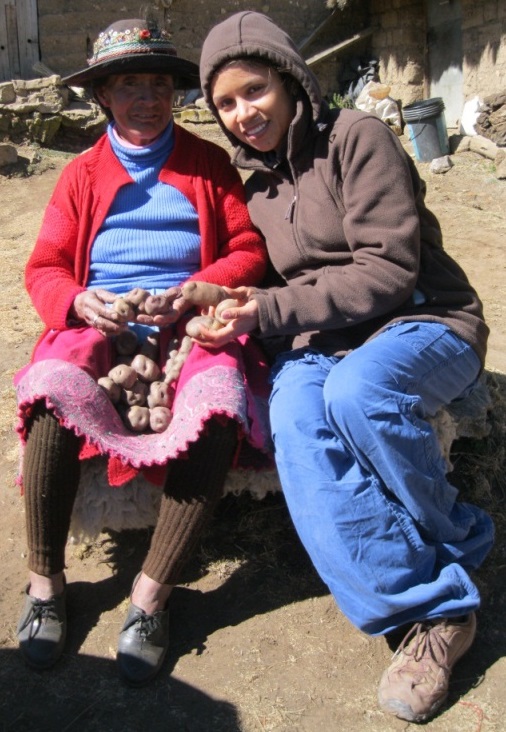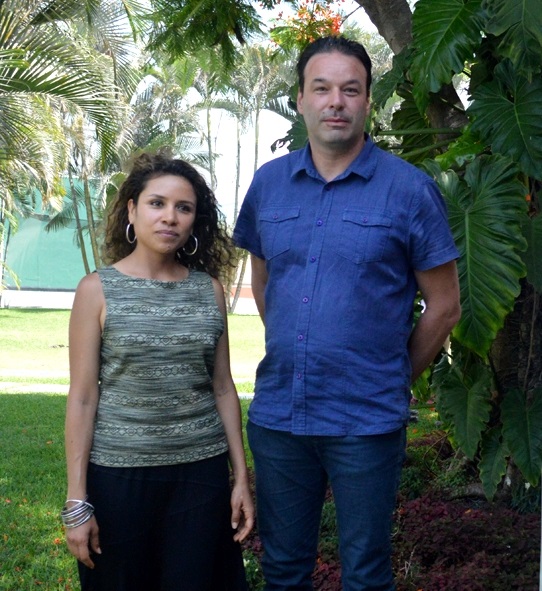The contest, which attracted 35 entries, was organized by the Peruvian Ministry of the Environment (MINAM) and Ministry of Economy and Finance, in a public-private partnership with ESAN University and German Development Cooperation (GIZ). The prize was a laptop and a scholarship for an international diploma course in the Executive Education program of ESAN University.
The main subject of the Ph.D. thesis of Alejandra Arce —who works at CIP under the supervision of Stef de Haan, leader of the Genetic Resource program, and Gordon Prain, leader of the Social Sciences Program— is the resilience of socio-ecological systems from the perspective of the in situ conservation of potato agrobiodiversity in the Central Andes of Peru. “The topic I presented to this research contest, on the impacts experienced by high Andean farmers with regard to climate change, is a fragment of my Ph.D. thesis,” explained Arce. This study is relevant for her Ph.D. studies in Agroecology, which she started at Universidad de Antioquia in Medellín, Colombia, in February 2012.

Alejandra Arce with a potato producer in Huancavelica, Perú
In the context of high Andean agricultural systems, climate variability is not a contemporary phenomenon, but rather an age-old driving force for change and adaptation. “In Peru’s Central Andes, the farmers traditionally have to cope with different types of climate stress, such as extreme cold spells, hail, excessive rain and drought, and they make use of resources such as their diversity of potatoes in the seed systems, which give a greater capacity of adaptation to their production systems,” explains Arce.
Through participatory mapping, using geographic information systems, yield samplings and sampling of diversity in 312 potato plots in the departments of Pasco and Huancavelica, she managed to quantify the economic losses and yield losses caused by climate phenomena. For this work, she had the support of Henry Juárez, who heads the Geographic Information Systems (GIS) laboratory at CIP. Through workshops with the population, she became familiar with the local perception of climate variability, and potential local attributes of resilience and vulnerability were identified. The study showed a complex relationship between production capacity and diversity, with an intervention of biophysical factors –such as the response of the varieties to different types of climate stress– and socio-ecological factors, such as location and management. “Both the negative economic figures and the local perceptions suggest that other mechanisms of public investment besides the Agricultural Catastrophe Insurance will be required,” said Arce. Since the research offers preliminary data from one season only (2012-2013), it is far from being definitive, so the author recommends that follow-up be performed with certain adjustments of methodology in the years to come.

Alejandra Arce and Stef de Haan
After carrying out additional analyses of the diversity-yield relationship in the departments of Pasco and Huancavelica, the young scientist hopes to embark on another research component regarding potato seed systems, to understand the structure and dynamism of the seed systems in the Central Andes of Peru. A third component of her thesis consists in analyzing the relationship between agrobiodiversity and nutrition in the context of the Chopcca communities of Huancavelica, in cooperation with the Nutrition Research Institute (IIN) and Yanapai Group, an NGO partner of CIP.
Alejandra Arce’s work will be published by GIZ in April 2014 and it will become a scientific article with additional exhaustive analyses by mid-2014.
